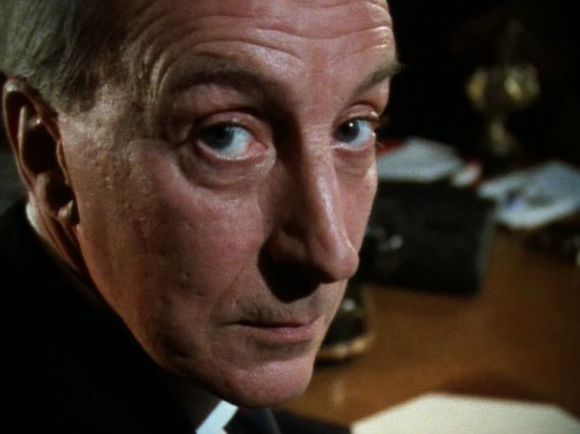The first ballot for the Conservative leadership election is six days away and Francis Urquhart has finally thrown his hat into the ring. Patrick Woolton and Michael Samuels are formidable opponents, but Urquhart and his faithful shadow, Tim Stamper, can certainly deal with some of the others, such as McKenzie and Earl.
Ian Richardson and Colin Jeavons make a deliciously entertaining team. Both have immaculate timing and obviously relish the lines they’re given. Urquhart begins by mentioning Samuels, the health minister and wonders if they can work something at his next public appearance. Stamper acidly tells him that he “doesn’t go to hospitals anymore. Kept getting beaten up by the nurses I think he has trouble getting insured now.” But a visit to Cybertech (a wheelchair maker) serves just as well and a demonstration is engineered which culminates with Samuels mowing down a demonstrator in a wheelchair. One down …..
Next up is Harold Earle. He was tangled up with a rent-boy on a train some years ago (although it was all hushed up). Urquhart wryly observes that it would be very bad form to bring it all up again but Stamper counters that “getting sucked off for sixpence in a second class compartment is hardly prime ministerial behaviour.” A few pictures sent to Earle is enough to convince him that he should step down from the race.
After the first ballot, neither Urquhart, Woolton and Samuels have a clear majority – so a second ballot is called. The sex tape from Brighton (with Penny and an enthusiastic Woolton) is now pressed into service and this is enough to force Woolton out of the running, He proclaims his support for Urquhart (which should be enough to guarantee his victory). Patrick Woolton later tells his wife the reason why he decided to support Urquhart – and it wasn’t out of friendship. He believes that Samuels and Lord Billsborough engineered his downfall, so whilst he may dislike Urquhart he detests Samuels. Another small detail that feels very true to life is when he tells her that it’s also worth supporting Urquhart because he’s the older man. Old men die sooner and the sooner Urquhart dies, the quicker Patrick Woolton will be back.
With the house of cards beginning to wobble, Urquhart has to go to even greater lengths to protect himself. Roger O’Neill is clearly a liability, so Urquhart invites him down to his country house, gets him drunk and then laces his cocaine with rat poison. Whilst he’s doing this, he makes the following speech to camera. His soft, matter-of-fact delivery is truly chilling. “This is an act of mercy. Truly. You know the man now. You can see he has nowhere to go. He’s begging to be set free. He’s had enough. And when he’s finally at rest, then we’ll be free to remember the real Roger. The burning boy in the green jersey. With that legendary, fabulous sidestep and the brave, terrified smile.”
But even this isn’t enough to stop Mattie’s investigations. Thanks to a replay of her various audio tapes (and it’s remarkable how each tape she puts into her recorder plays at exactly the right point!) she begins to piece everything together and starts to believe the unbelievable.
She finds Urquhart at the House of Commons roof-garden and their final meeting (a complete reversal from Dobbs’ novel) is a justly memorable one. And with an unseen hand picking up Mattie’s tape-recorder (which contains Urquhart’s confession) it’s clear that the story is far from over.
As I’ve previously said, this is a thoroughly modern drama that really doesn’t seem to be twenty-five years old (only the slightly clunky computers date it). Ian Richardson and Susannah Harker, either together or apart, are incredibly watchable. Richardson imbues Francis Urquhart with a mocking, attractive persona (except on the odd occasion when real anger shows through). Harker’s Mattie Storin is, at different times, both manipulated and a manipulator.
It’s a memorable production and easily the strongest of the House of Cards trilogy.









